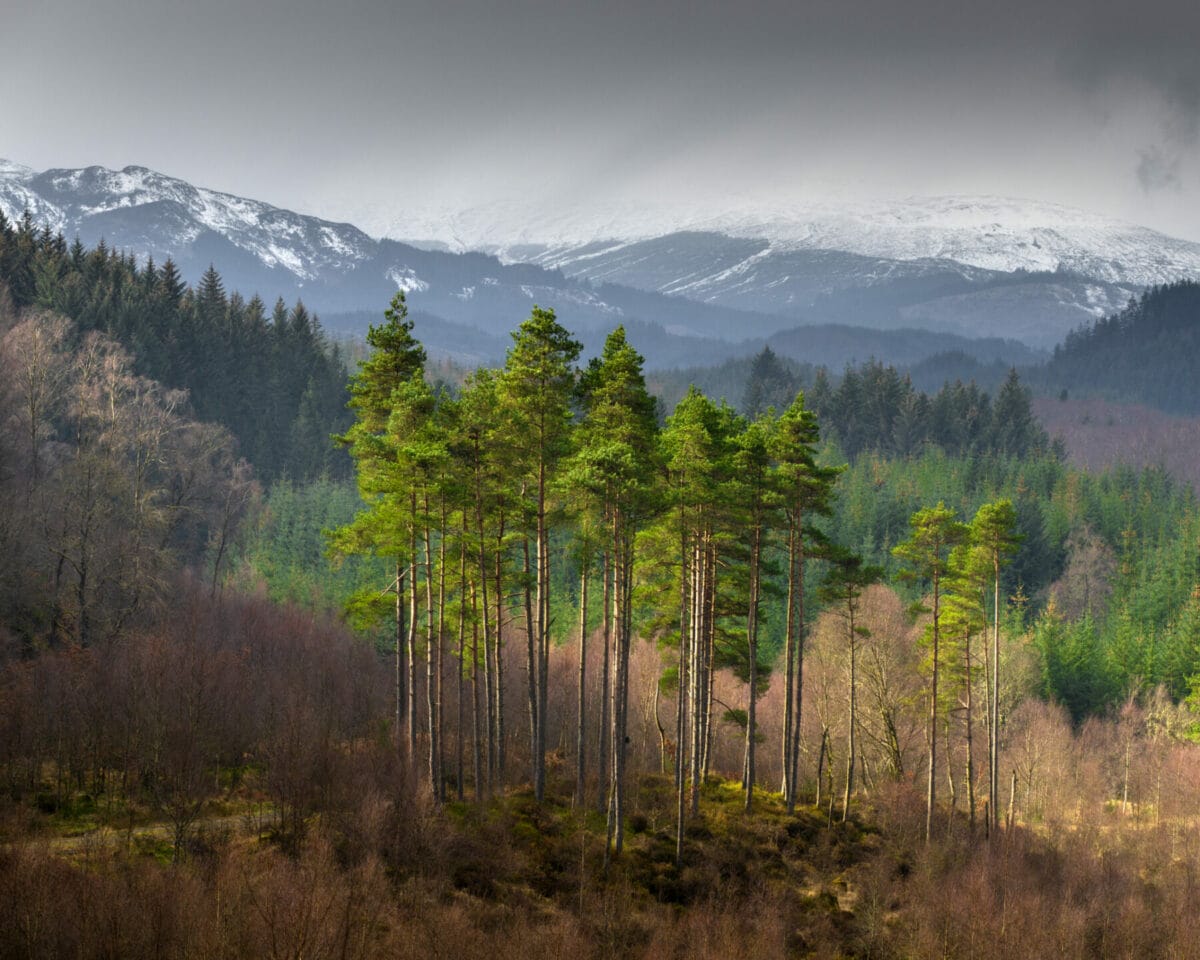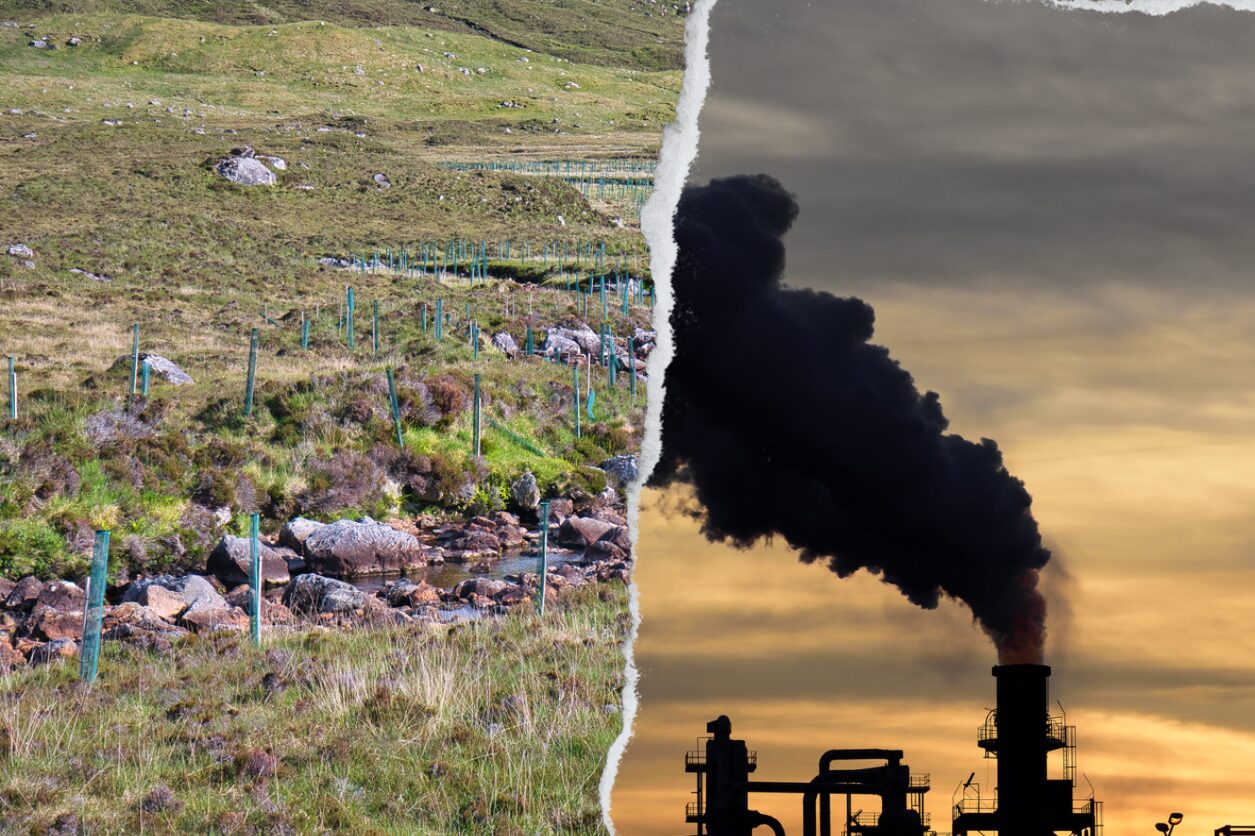A Scottish investment giant upped its shares in a host of US fossil fuel firms last year, while also claiming millions of taxpayer money for a carbon offsetting scheme to plant trees in the Highlands.
Analysis by The Ferret found that Edinburgh firm, Abrdn, increased the amount of US shares it owned in 33 coal, oil and gas firms between the end of 2022 and the end of 2023.
The value of its US shares in these companies increased by nearly £234m last year.
Abrdn also became a new shareholder in three companies drilling for oil in Texas in 2023, purchasing over£44m of their shares.
The investments were made despite the escalating climate crisis and the fact Abrdn joined a financial industry initiative to tackle global warming back in 2021.
Abrdn received a £2.5m grant from government quango Scottish Forestry in August 2023 to plant 1.5 million trees and restore degraded peatland on the Far Ralia estate in the Cairngorms.
The project will absorb carbon dioxide from the atmosphere and help offset the climate impacts of Abrdn’s UK property investments. Abrdn describes Far Ralia as proof of its commitment to “taking tangible action” on the “pathway to net zero”.
But critics said Abrdn was “in the territory of greenwashing” by accepting the tree planting grant while “investing in emissions generating activity” in the US. Experts on green finance argued it was “no surprise that Abrdn would increase its investments in fossil fuels given its very poor climate policies”.
Abrdn claimed it is a “responsible investor” which is committed to “driving the change required” to reach global net zero targets.
Naked opportunism is no way to serve the nation.
Professor Alastair McIntosh, land reform campaigner
Our findings come from examining changes to Abrdn’s US shareholdings which it must disclose every quarter with regulators in the States.
As an asset manager, Abrdn invests money on behalf of clients including pension funds, charities and wealthy individuals.
In total, the company owned £1.22bn of shares in fossil fuel firms listed on US stock exchanges at the end of 2023.
Among the companies it increased its shareholdings in last year were three of the global oil “supermajors” — ExxonMobil, Chevron and TotalEnergies.
A recent study suggested that oil expansion plans by the five supermajors could cause 11.5 million additional deaths worldwide due to extreme heat by 2100. All three companies were also accused of “doubling down” on fossil fuels in 2023.
Abrdn’s US holdings in ExxonMobil, Chevron and Total were together worth nearly £270m pounds at the end of 2023. All three companies were named among a list of 57 global firms – the so-called ‘carbon majors’ – who have been directly linked to 80 per cent of carbon dioxide emissions since 2016.
Other firms Abrdn bought more shares in last year included those who burn coal for energy and who are involved in fracking.
Abrdn says it will plant 1.5 million trees at Far Ralia and also restore degraded peatland at the site.
The trees will ‘offset’ the climate impact of the Abrdn Property Income Trust, which invests in real estate around the UK.

Offsetting is where a company compensates for climate polluting carbon dioxide (CO2) it produces in one part of its business by investing in activities like tree planting and peatland restoration which absorb CO2 from the atmosphere.
However, critics of offsets argue that some companies use them to ‘greenwash’. They claim that companies use offsets to boost their climate credentials without taking necessary steps to reduce their own emissions, such as an investment firm reducing its financing of fossil fuel companies.
A recent report on tree planting on Scottish land by the expert Royal Society of Edinburgh found respondents were concerned schemes were being used to greenwash by companies who are “doing little to reduce the emissions from their business”.
One campaign group that is critical of Scottish land being used for offsetting activity is Community Land Scotland, which argues for more community ownership of land and buildings.
Its policy manager Dr Josh Doble told The Ferret that it would be “concerning” to many rural Scots to see “land that could be working for the public good, instead being used by a finance group investing in emissions generating activity”.
“This brings them into the territory of greenwashing,” Doble said.” These kinds of offsetting projects allow business as usual for corporations, it increases already inflated Scottish land prices and fuels further speculative land acquisitions for corporations.
“This is not what Scottish land should be used for.”
Land reform campaigner and author Professor Alastair McIntosh echoed Doble’s view. “Historically the Scottish financial sector built its reputation on straight dealing and high integrity,” he said.
The “conflict of values” between carbon offsetting in Scotland and upping fossil fuel investments in the US risked damaging Abrdn’s reputation, McIntosh warned. “Naked opportunism is no way to serve the nation”, he added.
This brings them into the territory of greenwashing.
Dr Josh Doble, Community Land Scotland
Jonathan Middleton, a senior research officer at ShareAction – which works with the financial industry to promote responsible investment – was damning in his assessment of Abrdn’s approach to climate change.
“It comes as no surprise that Abrdn would increase its investment in fossil fuels given its very poor climate policies,” he said.
The company must “restrict” its investment in fossil fuels across all funds – particularly those which are the most carbon intensive – and not just those labelled as sustainable, he continued.
Abrdn has faced a backlash over its fossil fuel investments in recent years. Its annual general meeting in Edinburgh last year was targeted by protesters after The Ferret revealed it had bought bonds issued by the world’s largest private coal company, Indian conglomerate Adani.
But it did not buy bonds in Adani’s most recent offering, a move which has been commended by campaigners.
Nick Haines, campaign manager at Eko, said it was a sign that Abrdn had seen through Adani’s “greenwash”. “We hope that this is the first step towards a Paris-aligned climate policy from Abrdn that excludes all new bond investments in companies expanding coal, oil and gas,” he added.
A spokesperson for Abrdn said: “As a responsible investor managing assets on behalf of many clients with different mandates and investment objectives, we believe it is important for asset managers to assess whether it is appropriate to impose targets and restrictions where they have not been mandated by the client.
“However, we do offer a variety of funds and investments for clients who wish to invest in line with specific sustainable criteria. We currently manage £54bn in sustainable assets.
“As signatories to the NZAM initiative, we are committed to driving the change required to reach net zero targets.
“We will work with companies to encourage best practice and measure their transition to net zero. In cases where we do not see appropriate progress, we may use tools such as our voting powers to drive change.
“Where clients mandate, we can mitigate our exposure to coal and fossil fuels.”
Scottish Forestry’s director of operations, Brendan Callaghan, said all applications for grants for forestry were assessed “against the legal and good forestry practice requirements of the UK Forestry Standard”.
Abrdn is facing financial difficulties and plans to cut 500 jobs this year as part of a drive to save £150m a year.
It made headlines this week after its chief investment officer, Peter Branner, complained the press was making “childish” jokes about the company’s name change to Abrdn. The company was known as Standard Life Aberdeen until 2021.
Branner said in an interview that jibes about the missing vowels in Abrdn’s name were “corporate bullying”.
City AM ran a front page on Tuesday ostensibly apologising to the firm. It read: “Abrdn: an apology – sry we kp tkng th pss ot of yr mssng vwls”.
Meanwhile, the Financial Times urged journalists to ‘Lv Abrdn aln!’.
Main image: Alan Morris/beaucroft/iStock
This Ferret story was also published in the Sunday National. Our partnerships with other media help us reach new audiences and become more sustainable as a media co-op. Join us to read all our stories and tell us what we should investigate next.














